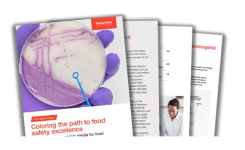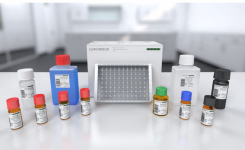Thermo Scientific Test Helps in Battle Against MRSA
go back to news archives| | Recent news reports describe the latest strategies and developments adopted by the NHS and drug companies in the ongoing fight against methicillin resistance in Staphylococcus aureus (MRSA) (refs1,2). As these and other measures are considered, the Thermo Scientific PBP2' Test is able to enhance treatment and infection control efforts by allowing MRSA to be detected a day earlier than traditional antimicrobial susceptibility testing (AST). |
| In addition, drug companies continue to explore treatment options that will be effective against these resistant organisms. One group in the UK are in the early stages of investigating a way to make MRSA strains vulnerable to the antibiotics it normally resists (ref 2). |
Source : Thermo Scientific. View archived contact details
Posted on November 10, 2004
















